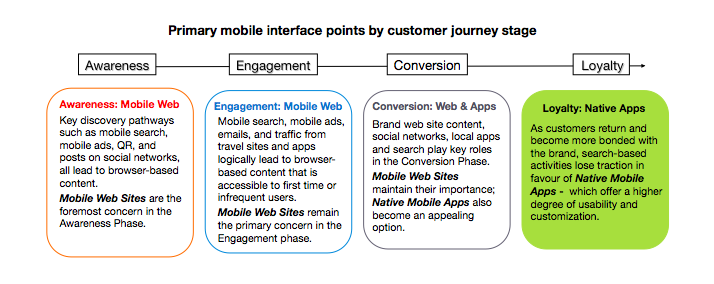Which Comes First, The Site Or The App?
There are a few questions I’m asked almost daily in the course of my work. For example, “is the iPad a mobile device?” And, of course, the classic “Is this the year of mobile?” (Yes, they’re still asking….) One of my favorites is, “What should I develop first — a mobile site or a mobile […]

One of my favorites is, “What should I develop first — a mobile site or a mobile app?” It’s an easy question to answer, at least in most cases.
But if it is a question you are trying to answer within your organization, you need details. So let’s proceed with the long explanation.
Consider the Customer Journey
The easiest way to approach the app vs. web conundrum is to frame it within the context of the customer journey. Talk to customers of any business, in any vertical, and they will usually tell you very similar things about their habits.
As a rule, mobile users across all verticals prefer web sites during initial encounters with a brand.
As their loyalty to that brand deepens and engagement increases, their preference switches to mobile apps. Speak to your customers about their preference for one vs. the other and you’re likely to hear something like this:
- “When I hear about a new brand, I search the web via desktop or mobile to learn more.”
- “If my relationship with a brand is going to be very brief or intermittent (e.g. once every few months or so), I probably will not download an app.”
- “If my relationship with a brand is intense or long-term — e.g. I buy a product that needs upkeep, become a repeat customer or join a loyalty program, I would prefer an app to manage the relationship from there on.”
- “I prefer apps because the experience is usually more tailored to my needs — e.g. streamlined content, higher level of usability, option to save info, no need for a constant data connection, etc.”
This isn’t to say, of course, that apps have no place at the beginning of the customer journey, nor that the mobile web has no place at the end.
What Consumers Want Depends On The Current Relationship
It is clear, however, that users gravitate to a certain type of mobile experience at specific points throughout the relationship.
The mobile web is easy to access and offers a broad breadth of content that one finds useful in the earlier stages of discovery and awareness. Whereas with apps, there are the interim steps of finding the right app and downloading it.
Quite often, you need to download and install several before you find one that meets your needs, assuming you find one at all. It’s a more complex medium to engage with as a user (plus, it takes up what may be valuable device storage space), hence we tend to view apps as more of a commitment.
Once the relationship is established — when we’ve bought that car, signed up for that subscription, joined that loyalty program — then we’re much more open to the idea of granting you a permanent spot on our smartphone or tablet desktop.
And that, after all, is the goal. Or at least it should be. This medium isn’t about generating downloads, it’s about generating engagement.
Downloads Are Overrated
Downloads are no big deal if downloads are all you want — you can buy them these days, if somewhat indirectly, via media. Engagement clearly takes a lot more effort.
An app content strategy that focuses on supporting the ongoing customer relationship is a start, but it doesn’t end there. Marketers are starting to realize that apps, much like websites, need constant cultivation with content continually refined to meet the evolving needs states of the loyal consumer.
We’ll explore the role of bought, earned, and owned Media in the app marketing ecosystem in my next post but, for now, consider this: the average smartphone user looks at his or her device upwards of 30+ times day. What is a spot of on this coveted piece of personal real estate worth to your brand?
Opinions expressed in this article are those of the guest author and not necessarily MarTech. Staff authors are listed here.
Related stories
